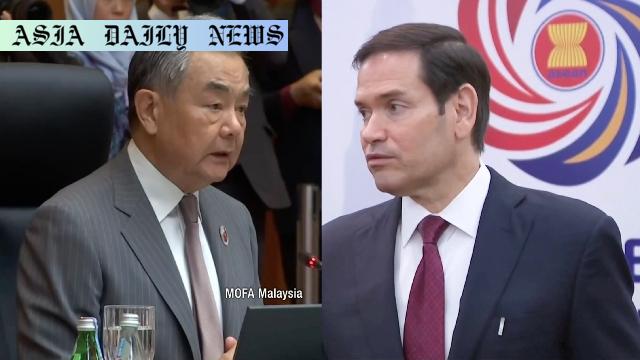Diplomacy: US Secretary Marco Rubio and China’s Wang Yi meet after ASEAN discussions to build strategic stability and cooperation.
The US and China held constructive talks following the ASEAN meeting.
The diplomats discussed strategic stability and communication.
Future cooperation and a potential Trump-Xi meeting were highlighted.
The meeting emphasized strengthening mutual trust and dialogue.

Introduction: US-China Diplomatic Engagement Post-ASEAN
The recent face-to-face meeting between US Secretary of State Marco Rubio and Chinese Foreign Minister Wang Yi has marked a significant step toward mending strained relations between the two global superpowers. Hosted in Malaysia following an ASEAN gathering, the discussions revolved around combating geopolitical tensions and fostering stability. Both nations have underscored the importance of strategic correspondence and mutual trust, which were core themes of their diplomatic engagement. Such steps come at a time when the global arena is marked by unpredictability and challenges, making dialogue between these two powerhouses extremely crucial.
Focus on Strategic Stability and Trust
The dialogue gave both diplomats an opportunity to prioritize key issues, enabling steps toward ‘strategic stability.’ Rubio described the interaction as constructive and promising, indicating openness to cooperation. The meeting also served as a platform to rebuild trust between the nations, which has taken a hit over issues such as trade imbalances, technology disputes, and geopolitical frictions. Both parties recognized the need for deepened communication that paves the way for collaborative solutions in areas like climate cooperation, pandemic management, and global economic recovery. Rubio’s diplomatic tone, citing this meeting as an avenue for improvement, restored optimism not just in the ASEAN region but on a global scale.
The High Probability of a Trump-Xi Meeting
One of the notable outcomes of the meeting was the possibility of a future meeting between US President Donald Trump and Chinese President Xi Jinping. Although no date has been deliberated, Rubio’s remarks about a ‘high probability’ of such a meeting have fueled hopes for direct dialogue between the national leaders. Such a meeting might potentially address long-standing bilateral tensions and work toward stabilizing economic agreements. Experts suggest such proactive initiatives signal the willingness of both entities to work through differences with a focus on shared futures. The Trump-Xi connection may yield synergies in trade agreements, technology sector collaborations, and educational exchange programs.
Implications for ASEAN and Global Diplomacy
The timing and location of the Rubio-Yi meeting are also significant. Taking place after the ASEAN discussions, it underscores the strategic role that Southeast Asia plays as a region where US-China diplomatic and strategic interests often converge. ASEAN’s importance as a geopolitical platform continues to grow, with its member nations benefiting from US-China collaborative gestures. Moreover, fostering stability in Southeast Asia creates ripple effects for the global economy, bolstering sectors like trade and technological innovation. With proper diplomacy facilitating multilateral coalitions, ASEAN could act as a crucial engine for ushering global peace and collaborative growth.
Building a Roadmap for Trust-Based Dialogue
Lastly, discussions between Rubio and Yi emphasized fostering better communication channels between Washington and Beijing for the long term. As both sides aim to mend frictions stemming from past diplomatic and economic disagreements, this meeting is being hailed as a crucial waypoint for renewed dialogue. Observers have pointed out that while this engagement won’t address all pressing differences overnight, it successfully mapped out areas where trust and partnerships could yield significant outcomes over time. If followed through with actionable initiatives, this could form a precedent for sustained conversations benefitting bilateral relations.



Commentary
The Importance of US-China Collaboration
US-China relations carry immense global impact, with their cooperation or discord affecting economies, geopolitics, and even societal issues worldwide. The recent Marco Rubio-Wang Yi meeting has ignited hope for a balanced approach toward various shared challenges. For years, tensions have plagued this relationship, but steps like these provide optimism for a new era of strategic collaboration. Emphasizing mutual trust and stability is certainly a wise strategy in the current geopolitical climate, as divisions not only harm these two countries but ripple through the global community.
ASEAN as a Crucial Diplomatic Platform
ASEAN has quietly but steadily risen as a hub for resolving crucial East-West issues. By hosting these talks, Malaysia sends a positive diplomatic signal about its ability to facilitate positive interactions among global heavyweights. ASEAN’s centrality in discussions like this further highlights how smaller regions can amplify their global importance by playing roles in mediation and trust-building. It also underscores the importance of Southeast Asia in bridging strategic alliances between conflicting giants on issues ranging from technology to trade.
Opportunities in Trust Building
While the talks seem promising, building trust isn’t an overnight process. There will undoubtedly be setbacks along the way. However, trust-building measures like strengthening communication channels are essential tools that allow for resolving even longstanding conflicts. Frequent US-China engagements such as this must evolve toward results-driven discussions, such as pandemic collaborations or economic agreements, for trust to flourish. A long-term roadmap that incorporates the outcomes discussed at ASEAN could guide future global diplomacy focused on unity over divisiveness.